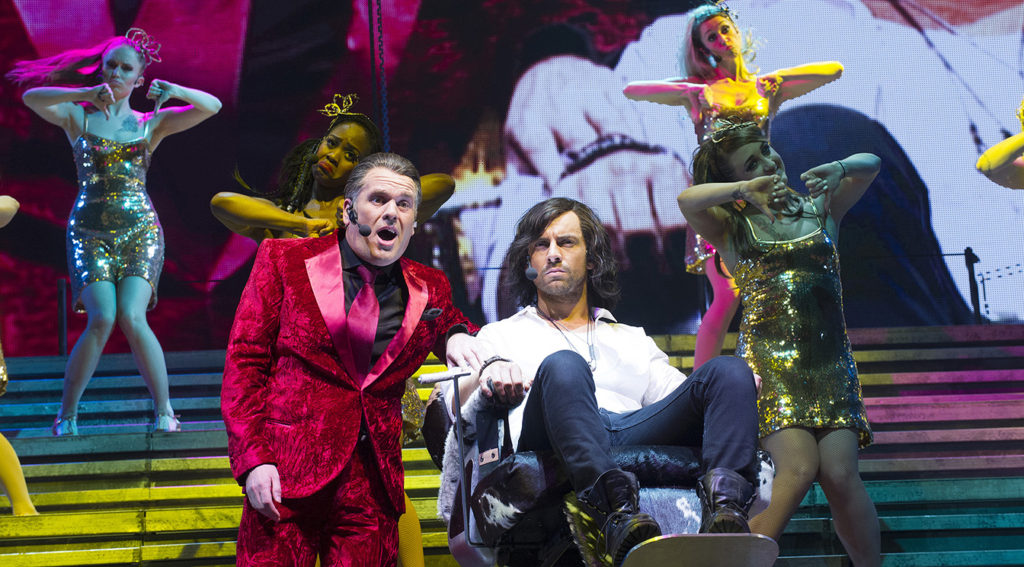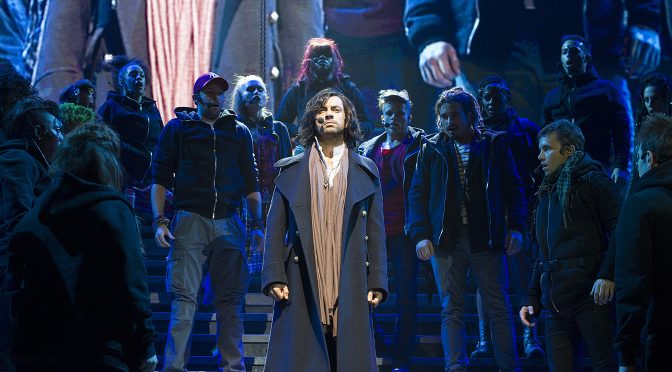Andrew Lloyd Webber’s generous gift to theatre-goers confined through Covid-19 during the Easter weekend is, appropriately, the passion story. Retold with an exciting rock score and the brilliant lyrics of Tim Rice, it is one of Webber’s most adventurous endeavours, dating from 1970. This arena production from 2012, while not my favourite, is still a real treat.
The production is star-studded and had a TV competition behind it that led to the casting of Ben Forster in the title role. Mel C of the Spice Girls takes the part of Mary Magdalene and Tim Minchin, a personal hero, is Judas. The delivery is clear, nobody sounds unpleasant and they can all perform to big crowds – important given the settings for the tour – indeed, each gets better as the show progresses. But none of the leads is actors. None manages to get beyond their public personas. Minchin still even sports his trademark eye make-up, and the close-ups provided by a filmed performance highlight this shortcoming.
Things are much better with the Pharisees: Pete Gallagher and Gerard Bentall are strong. Best of all is Alexander Hanson’s very classy Pontius Pilate. All three not only sound great but bring depth to their roles. Hanson’s part during the 39 Lashes is a real study in how to hold a stage. These achievements are despite, rather than aided by, director Laurence Connor’s ideas for the show.
There’s a frisson at the start with a suggested connection between Jesus as a revolutionary figure and modern-day rioters, courtesy of filmed news footage. And it’s understandable that the Occupy movement looked like a godsend for someone seeking to do something different with the show. That the hippy vibes from the original can be given a contemporary spin is fair enough. But the idea isn’t thought through or performed with enough skill. While difficult to judge on screen, the choreography looks suspiciously like a work-out routine and the large ensemble appears drafted en masse from the same drama school.
Some of the ideas fail abysmally. Casting the Pharisees as vaguely Masonic makes no sense, likewise having the Temple as some kind of nightclub surely miss the point that both reflect established religion. Instances of social media seem misplaced (cue projected hashtags) and lots of mobile phones are used. Remember that one of Rice’s best lyrics points out, “Israel in 4BC had no mass communication”.

The insistent temptation to form a connection with the crowd should surely have been resisted when it comes to mainstream media, too. Connor has Herod as a game show host (a very uncomfortable performance from Chris Moyles) while it is the press that interrogates Jesus as a celebrity. Filmed as he falls, as if paparazzi provide a new station of the cross, Forster does well. But you don’t need to be a reporter to ask these questions – the media as the medium are not needed – they quite literally get in the way. The particular power of this musical is that it deals with spirituality so directly, and with such humanity. Connor ignores that strength to the show’s detriment.
Available on The Show Must Go On! youtube channel until 12 April 2020
Photos by Tristram Kenton

